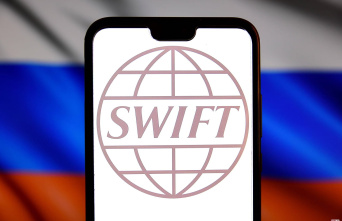LOAN GUARANTEED BY THE STATE. The EMP is back this year and upgraded with the Economic Resilience Plan! Its borrowing ceiling is raised for companies scratched by the rise in energy prices, following the war in Ukraine. For who ? How much ? We take stock.
[Updated Mar 17, 2022 10:49 AM] The EMP is likely to get a makeover in the coming weeks. Regardless of its size, a company affected by the economic consequences of Covid, then of the war in Ukraine may apply for it. It is through the economic resilience plan presented by Jean Castex on Wednesday March 16 that the PGE has just been upgraded. In fact, the PGEs have been relaunched to allow companies affected by the rise in the price of raw materials and fuel to get their heads above water. As a result, the PGE borrowing limit will be raised from 25% to 35%. A new EMP will even be implemented from July 1, 2022, until the end of the year for companies heavily impacted by the economic consequences of the war in Ukraine, as declared by the Minister of Economy , Bruno Le Maire. Companies will also benefit from the deferral of tax and social charges. In addition, the Bpifrance industry loan, longer than the PGE (10 years), will be open to the construction sector.
In response to the serious economic crisis experienced by France during the Covid epidemic, the government has put in place an exceptional system to support the bank financing of businesses. Amount of the maneuver, 300 billion euros. The loan guaranteed by the State (PGE). The latter is now extended until June 30, 2022, as confirmed by the Minister of the Economy, Bruno Le Maire in November 2021. The system is accessible to all companies in the territory, regardless of their size and legal form. . Only credit institutions, finance companies and certain SCIs are excluded. The amount of this PGE can reach up to 3 months of 2019 turnover or 2 years of payroll for innovative companies created since January 1, 2019.
It has also been agreed with the French Banking Federation that all companies wishing to do so, regardless of their activity and size, have the right to obtain an additional one-year deferral to start repaying their loan guaranteed by the state. A company having contracted a PGE in April 2020, and which would not be able to start reimbursing it in April 2021, may thus request a one-year deferral and start reimbursing it from April 2022. Also, the VSEs in a situation of serious cash flow stress will be able to benefit from an extension of the repayment periods for the PGE from 6 to 10 years.
For repayment of the state-guaranteed loan, companies have several options:
And concretely, how does it work? "Two to four months before the anniversary date of subscription of the PGE, the banks get in touch with their customers to examine with them the desired repayment terms", explained Solenne Lepage of the French Banking Federation. "The choice is in the hand of the customer". Want to get a one-year deferral of repayment and depreciation? Keep in mind that this postponement is not automatic.
“We send an information letter, offering him the amortization solutions four to five months before the due date”, detailed Gaelle Lejoux, director of the Reims regional business center at Société Générale. "Then, our account managers contact the customers to discuss the reimbursement terms envisaged. The account manager will advise the customer according to the elements of business recovery and their repayment capacity to define the most suitable option. (...) The idea is that it has leeway to continue its development to manage an environment that is not yet stabilized". Once the choice has been made, the customer only has to fill in the appendix attached to the information letter, allowing the electronic signature of a "financial conditions letter". Contacted by Linternaute.com, BNP Paribas, LCL and Crédit Agricole described conduct similar to this, with the signature of an endorsement.
The Banques Populaires have opted for a fairly similar process. The customer receives a letter before the anniversary date of his PGE, but he does not necessarily need to go through his adviser. "With the help of his adviser if necessary, the customer connects, chooses and signs directly from his Internet space or returns his mail of choice free of charge", explained Bertrand Magnin, director of development at the Banque Populaire. "We have opted for a fluid and automated operation in order to make life easier for our customers and to speed up processing times as much as possible, especially in these extremely anxiety-provoking periods".
These differences in process can sometimes cause confusion in the minds of some business leaders, especially in the perspective where they ask for a one-year deferral of their EMP. They may sometimes feel like they have to sign a new EMP contract with their banker.
The Deputy Director General of the FBF wants to be extremely precise. "We must not talk about extension, because that refers to the duration of the PGE, and that is not possible since the European regulatory framework limits the duration of the PGE to six years", reminded us Solenne Lepage. "On the other hand, what is proposed is a capital amortization deferral of one year. The formalism may differ from one bank to another, but legally, the choice to amortize the loan gives rise to an amendment" .
All the banking interlocutors we contacted assured us: the customer remains the sole decision maker. The business manager is therefore the only one to choose the repayment and amortization scenario for his PGE. A state of affairs that makes the National Credit Mediator think that there should be few conflicts. "The banker can discuss, advise, but it is the company that chooses: either it reimburses, or it asks for a spread, but the spread is by right", Frédéric Visnovsky told us. "There can therefore be no disputes over the terms of reimbursement". "The question of reimbursement arises quite calmly, insofar as the files have been studied upstream, the distribution of the PGE being almost automatic, but not automatic and insofar as, as we can see, flexibility exists" , underlined Solenne Lepage of the FBF.
“The difficulty behind all this is that the PGE adds additional debt,” added Stéphanie Pauzat of the CPME. "The risk is therefore that companies end up with a huge amount to repay and unsustainable monthly payments". A situation that is all the less tenable as it risks further penalizing companies wishing to invest in the future.
So what solutions are on the table? Employers and professional organizations have pleaded for solutions, such as the cantonment of Covid debt or the creation of a debt consolidation loan. “Restructuring the debt will make it possible to approach the recovery under better conditions,” asserted Roland Héguy of the UMIH. "The future of the tourism sector could still be violently shaken in the months to come. However, we must be able to maintain a quality offer made in France, so as not to be overtaken by European and global competition, which risks to be ferocious. We have no right to miss each other".
The French Banking Federation, it was not in favor of a modification of the EMP. "The EMP is a tool that works well as it is," said Solenne Lepage, its deputy director general. "Its big advantage is that it is readable and simple: the rules must remain unchanged, this seems very important to us. Moreover, the EMP is not the only tool in the landscape of funding sources". Bercy has set up, in agreement with the banks, the Relance equity loan, the objective of which is no longer to support the cash flow of companies, but to strengthen their equity.
Representatives of businesses, banks and institutions meet regularly at Bercy to address these issues. “I am working […] to see if other systems might be necessary to support companies for which neither the equity [the PPSE], nor the lag of the PGE is sufficient”, had thus indicated Bruno Le Maire.
All businesses and professionals, regardless of their size, legal form or activity, with the exception of credit institutions and financing companies are eligible for the State Guaranteed Loan (PGE). Here is a non-exhaustive list of beneficiary companies, you will find the complete list right here.
Bruno Le Maire announced the extension of the marketing of the PGE until the end of June 2022. It was to end on December 31, 2021. The nature of the PGE has evolved: the loan guaranteed by the State can be contracted in order to settle debts with suppliers, and no longer just as cash support. The stated objective is to avoid the wave of business bankruptcies once the aid has been stopped.
Created in March 2020, the PGE (loan guaranteed by the State) provides cash assistance for all companies, regardless of their sector and size. It can represent up to three months of turnover. The state guarantee represents 70% of the loan, sometimes more (see below). While it was supposed to disappear on December 31, 2021, the state-guaranteed loan scheme (PGE) will be extended until June 30, 2022, as confirmed by Bruno Le Maire in November 2021: "All companies that had prospects before the health crisis must take full advantage of the recovery. This is why we are extending the distribution of PGEs by six months", declared the Minister of the Economy.
Invited on the set of the Matinale France Info, this Monday, January 24, Bruno Le Maire wanted to reassure the owners of small businesses and traders: "We have concluded an agreement with the banks so that those in difficulty can go and see the mediator of the Banque de France in order to spread the reimbursement of their PGE over 10 years and no longer over 6 years". After contacting their bank, the companies concerned will have to contact the Credit Mediation of the Banque de France or the departmental crisis exit advisers, pending a decree.
These measures are aimed at “a few thousand companies (…) who see the deadline for next spring approaching and say to themselves: ‘I will not be able to repay’”, explained the minister. Or "25 to 30,000" very small businesses, often traders, craftsmen or restaurateurs. "The state-guaranteed loan that has saved tens of thousands of businesses must not sink them when they are repaid," said Bruno Le Maire. Some 697,000 companies have contracted a PGE since March 2020, for a total outstanding amount of 143 billion euros.
Bruno Le Maire announced that SMEs and VSEs wishing to extend the duration of their loan will be able to benefit from a rate of between 1% and 2.5%, "particularly advantageous". "The discussions led (to this result) yesterday in a constructive spirit with the banks," he said. In total, 600,000 small businesses are affected and have borrowed from banks in recent months "at a very preferential rate, 0.25% for one year", recalled the Minister of Economy. In detail, the rate will depend on the time requested and granted by the banking establishment. Here's what Bercy confirmed in a statement:
Bruno Le Maire recalled that "these entrepreneurs are not committed to their individual assets in this loan guaranteed by the State". "Whatever happens, we're not going to seize their assets like they might in another form of loan." In the press release from the Ministry of the Economy, the Minister Delegate in charge of SMEs Alain Griset welcomed the “excellent news” of the rate conditions.
The Loan guaranteed by the State is a cash loan. It can amount to up to three months of turnover. Start-ups can benefit from a loan of up to two years of payroll. What about the state guarantee? It reaches 70% of the loan in most cases (90% for small and medium-sized enterprises). "It is possible to make a request grouping several loans", says one on the site service-public.fr. "The cumulative amount of these loans must not exceed 25% of turnover or 2 years of payroll for a new or innovative company (start-up).
The PGE is not a loan granted by the State. To obtain one, you must turn to your usual banking establishment. Note that since the decree of May 6, 2020, you can also contact a loan platform with the status of crowdfunding intermediary. Placed on the market since March 24, 2020, the PGE is marketed until June 30, 2021, unless there is a new decision from Bercy. The steps then depend on the size of your company:
The equity loan is a device intended to strengthen the equity of companies in difficulty in the context of the health crisis, and not the cash like the loan guaranteed by the State. It concerns small structures that are struggling to obtain a PGE.
In detail, the money from the loan must make it possible to finance development projects. If granted by the banks, the money for the loan comes from the private sector. Investors, on the other hand, benefit from profit sharing. Participatory loans are guaranteed by the State up to two billion euros. The Minister of the Economy, Bruno Le Maire, has announced his intention to strengthen them. In total, 20 billion euros will be invested, said the Bercy tenant at the microphone of BFMTV on April 14.
8












